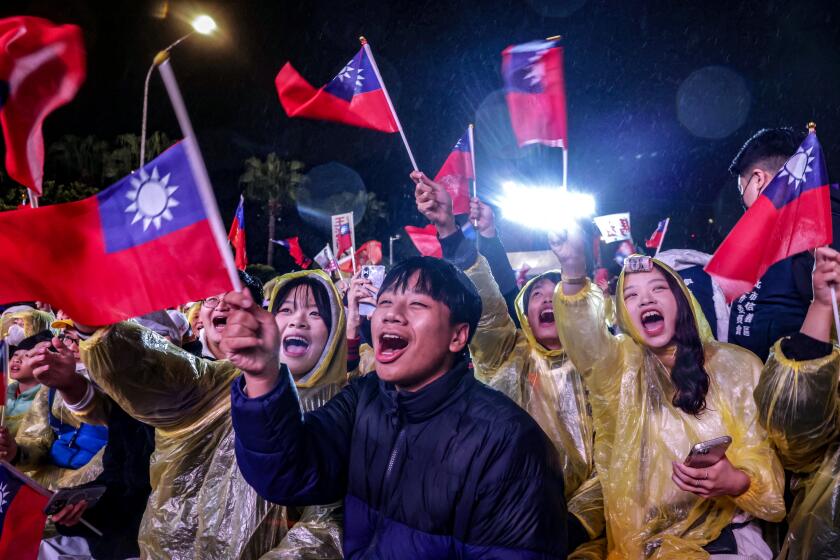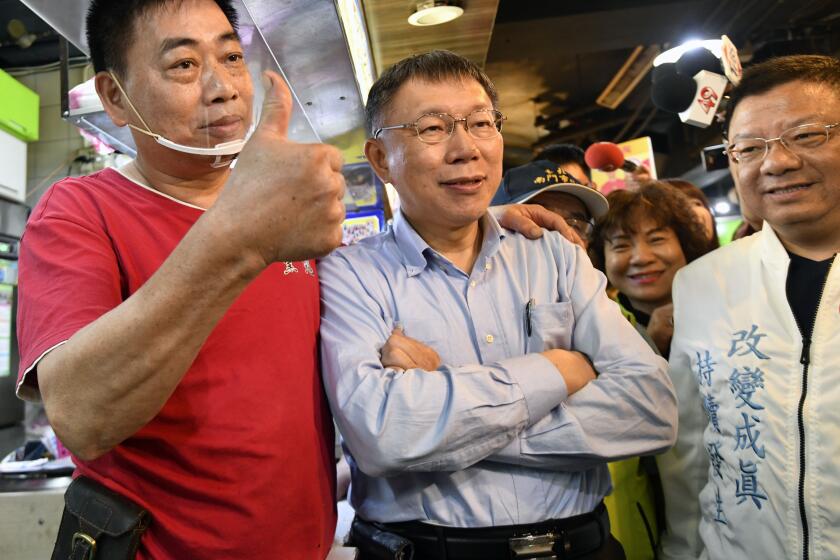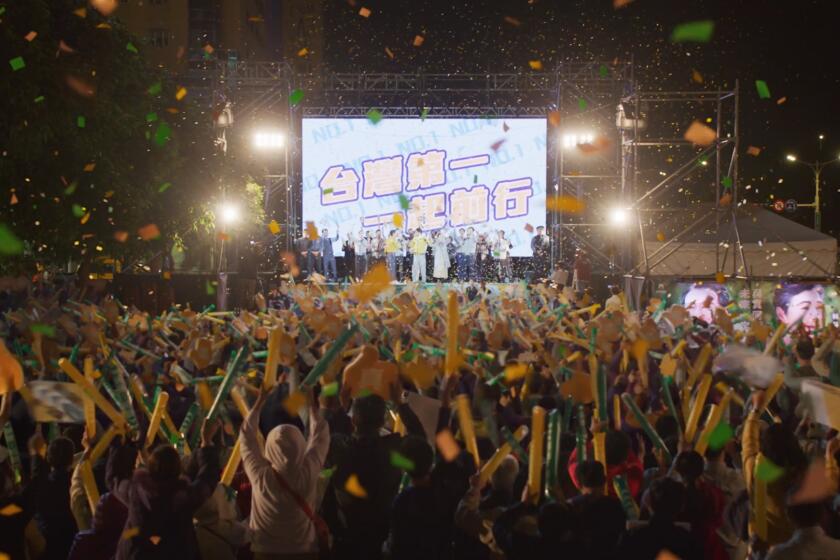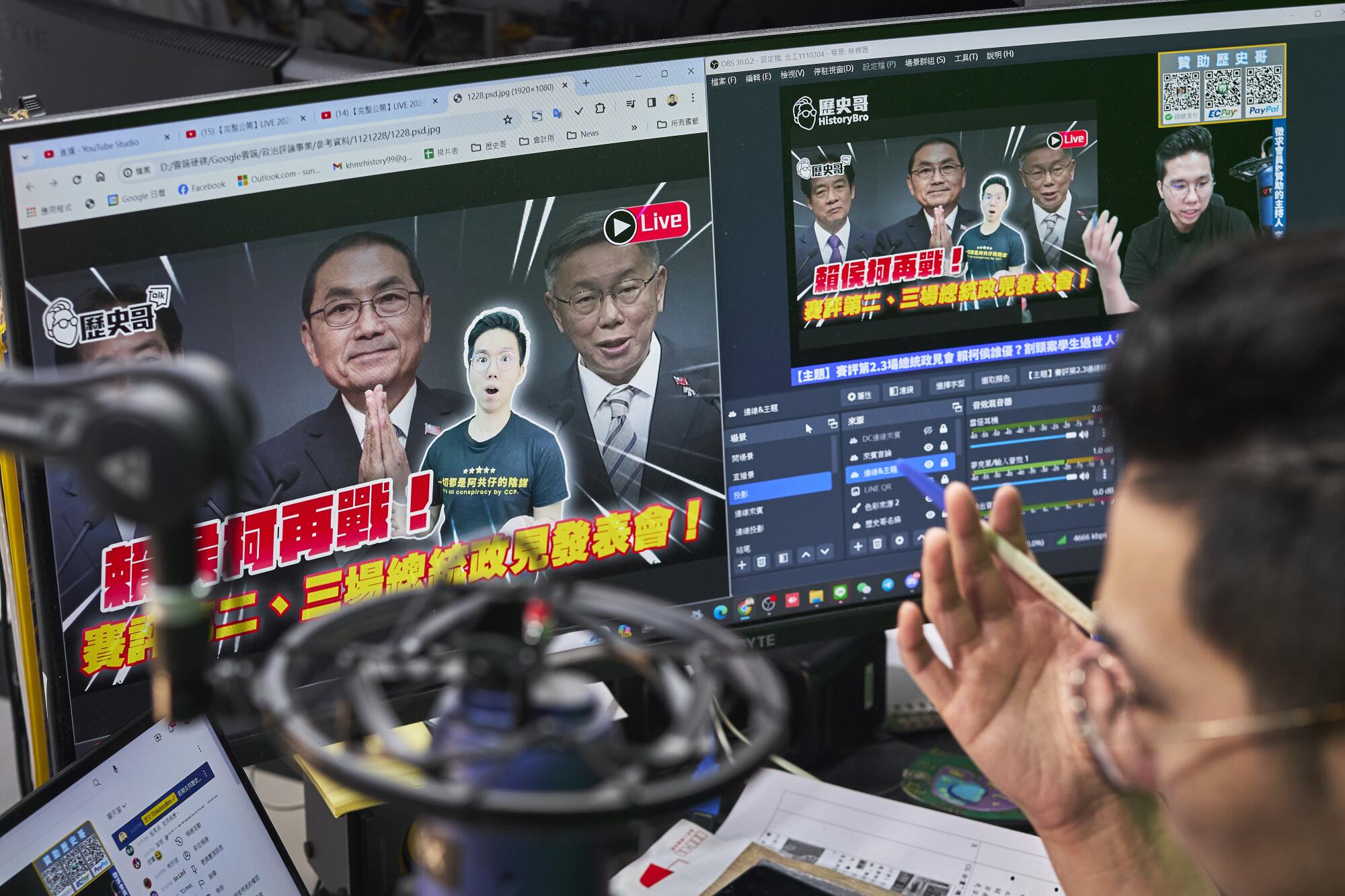
- Share via
TAIPEI, Taiwan — Jackie Chiang remembers when her father-in-law was gentle and kind, taking his grandkids to school and peeling cooked shrimp for her at the dinner table.
These days, he stews silently in front of the television, convinced by the political commentators he watches that if Taiwan’s ruling party wins another presidential term, the consequence will be war — and the U.S. won’t lift a finger to stop it.
“You’re going to die, your kids are going to die, my kids are going to die, we’re all going to die. Why do you want to do that?” Chiang, who lives in the northwestern Taiwanese city of Taoyuan, quoted her father-in-law and other relatives as saying.
The fear that the Democratic Progressive Party, or DPP, along with the U.S., is propelling this self-ruled island closer to combat has become a common refrain ahead of Taiwan’s presidential election Saturday. It’s also one of the narratives that mainland China has propagated in recent months through state media, fake internet accounts and Taiwanese commentators in a widespread and increasingly sophisticated disinformation campaign, independent researchers say.
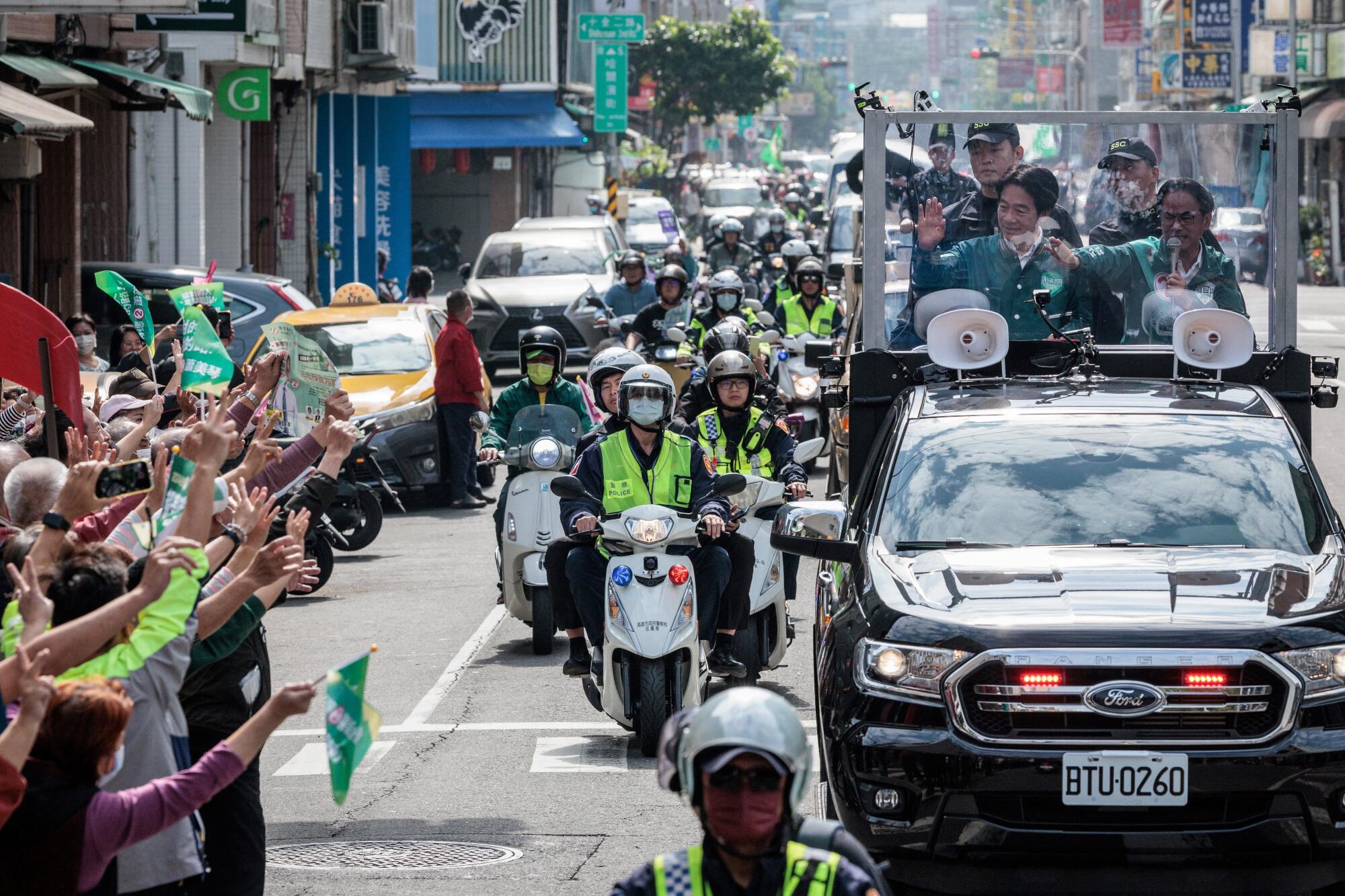
On Line, a popular messaging app in Taiwan, Chiang’s group chats have been overrun with such claims. Since the middle of last year, many of the forwarded messages have featured grim images of war-torn Ukraine and warned of the possibility of a similar conflict at home. Some posts have been lifted directly from mainland Chinese platforms such as short-video apps Douyin, which is owned by the same parent company as TikTok, and Bilibili.
“Vote for the DPP and the young will go to war,” declares the caption on one photo showing tanks and soldiers. “The people need to wake up. Only you can save your own lives.”
Chiang’s in-laws stopped sending anti-DPP photos and articles to the family group chat after her brother-in-law began responding with fact checks, but she suspects their news sources haven’t changed.
Passions on both sides of Taiwanese politics are as intense as Democrat versus Republican, sometimes leading to conflicts in families and workplaces. And that has carried over to the U.S. Even some who have lived here for decades are obsessed.
“They receive the fake news every single day,” said Chiang, 51, who teaches at a test prep center. “It’s become really extreme.”
Chinese President Xi Jinping’s determination to claim sovereignty over Taiwan by whatever means necessary makes the island of 23 million one of the biggest targets of foreign disinformation in the world, according to V-Dem, a Swedish research institute.
Chinese officials have accused the front-runner in Saturday’s election, Vice President Lai Ching-te of the DPP, of making “separatist” remarks and driving Taiwan to the brink of war. Beijing has refused to engage with current President Tsai Ing-wen, who has strengthened ties with the U.S. during her eight years in office.
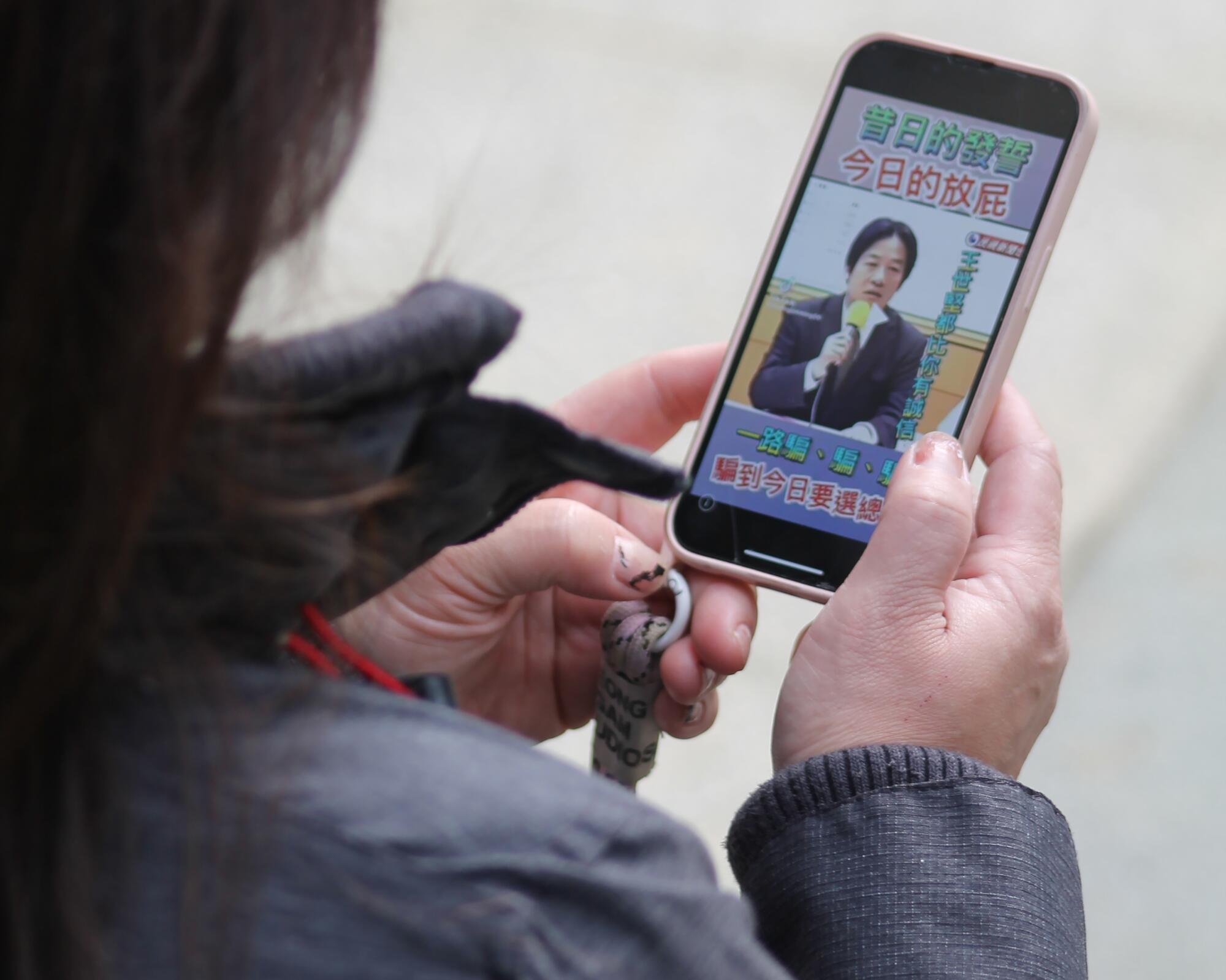
Both Hou Yu-ih of the opposition Kuomintang, or KMT, and third-party candidate Ko Wen-je of the Taiwan People’s Party, or TPP, espouse friendlier attitudes toward China, and would be a welcome change for Beijing.
According to an August report by the Taiwan Information Environment Research Center, which tracks disinformation, official and private Chinese actors have helped spread stories that portray the U.S. as anything from a weak ally to an active conspirator in a plot to hasten Taiwan’s demise.
Chinese trolls have since broadened their critiques of the ruling DPP, according to Taiwan-based research organization AI Labs. It identified several other narratives pushed by Chinese actors last month, including the economic fallout of disrupted trade with China, the alleged erasure of Chinese culture in Taiwanese education and claims that Lai illegally expanded his family home.
Analysts said that in previous Taiwanese elections, Chinese attempts to spread disinformation were more outlandish and easily identified, marked by telltale mainland jargon and IP addresses. This time, the efforts are subtler, focusing on magnifying existing anxieties, such as government corruption and shortages of eggs, power and labor.
Doctor-turned-politician Ko Wen-je has garnered substantial support in the polls by signaling a desire for middle ground on Taiwan’s China policy.
“What they want to amplify are real issues in Taiwan,” said Austin Wang, an assistant professor at the University of Nevada, Las Vegas, who studies disinformation in the U.S. and Taiwan. “Their strategy has become more skilled and more long-term.”
Aided by advancements in artificial intelligence, that strategy has blurred the lines between routine political mudslinging and targeted operations meant to influence voter behavior.
The KMT, which favors warmer relations with China, has frequently attacked the DPP for pushing Taiwan toward war. Some Taiwanese media outlets have owners with business ties in mainland China, and often publish stories that echo opinions from Beijing.
“If someone is pro-China, that is a valid political stance. But at what point does the government say that this is pushing the boundaries of what constitutes free speech?” said Lev Nachman, a political science professor at National Chengchi University in Taipei. “That balance is incredibly difficult to find in Taiwan.”
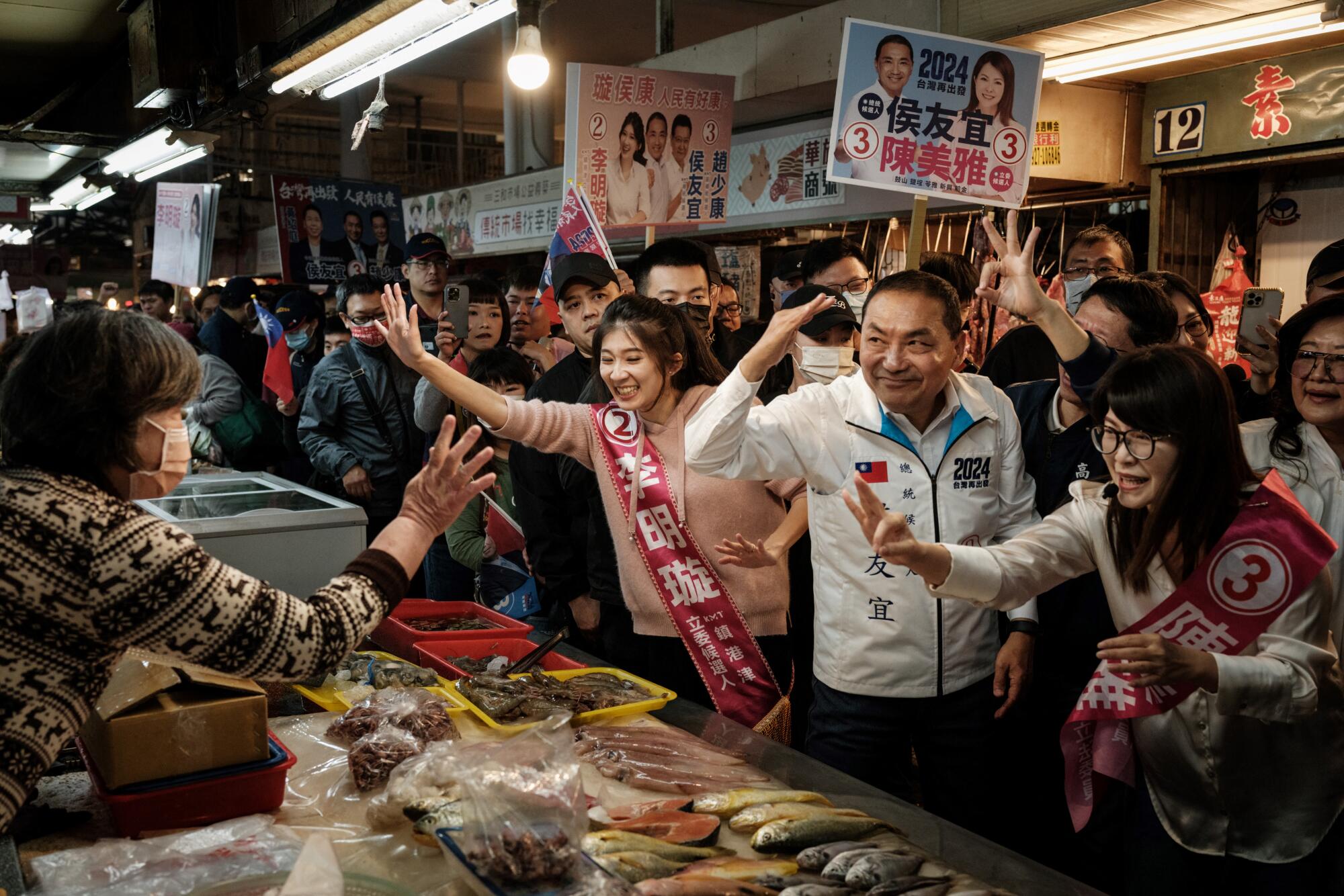
In June, Tsai, the outgoing president, warned that large-scale disinformation campaigns meant to undermine democracy are one of the biggest challenges facing Taiwan. She said the government needs to work with civil society and fact-checking organizations to educate the public on misinformation.
Spokespeople for the KMT and the TPP said that while some disinformation likely comes from China, most of it originates domestically and from political rivals.
The proliferation of dubious content in Taiwan is a symptom of widespread mistrust in its mainstream media, which often pursue sensationalism and are politically biased. After martial law was lifted in 1987, rapid expansion of the industry in such a small market led to hypercompetition that spurred outlets to prioritize readership and viewership over accuracy.
A new Taiwanese Netflix drama envisions a world of politics with women at the forefront — and tensions with mainland China conspicuously absent.
While Taiwan ranked first in Asia in press freedom last year according to Reporters Without Borders, a 2022 study from the Reuters Institute and University of Oxford showed that only 27% of respondents trusted local media — the lowest proportion in the Asia-Pacific region.
Many Taiwanese have turned instead to political commentators and online influencers, some of whose claims and arguments align with Beijing’s. That’s increased concerns that China is using local personalities to advance propaganda and even paying them for their services.
“Things that come out of the voices of Taiwanese are going to be more effective,” said Tim Niven, research lead at DoubleThink Lab, a Taipei-based nonprofit that studies disinformation. “If you have an entanglement of orchestrated action from foreign states and authentic organic local action, then I don’t think anyone has a clue on what should be done about that.”
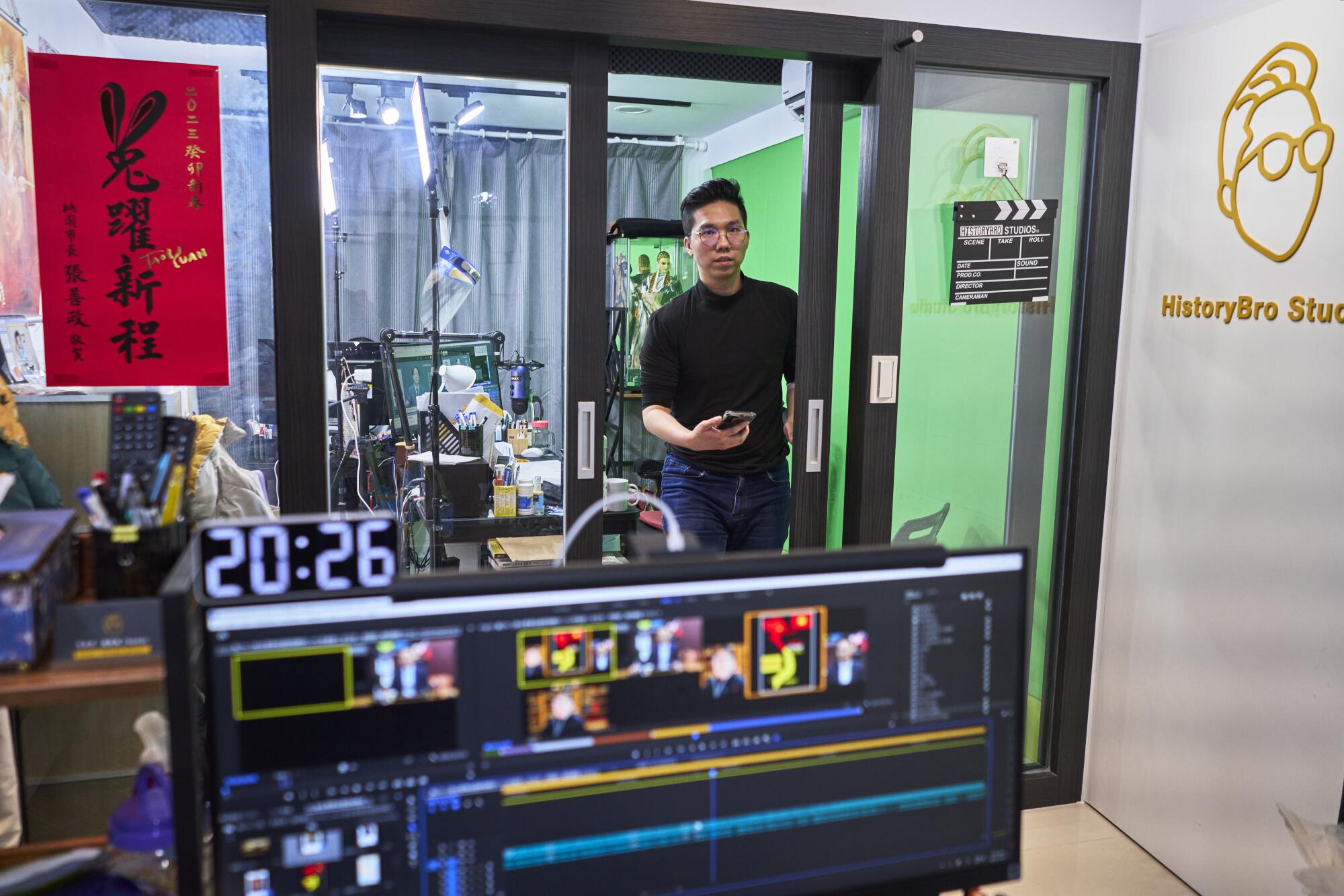
Lee Yi-hsiu, a political commentator known to his 268,000 YouTube followers as History Bro, said he has been asked by foreign media whether the Chinese Communist Party has paid him to spread pro-KMT opinions. His great-aunt, a fervent DPP supporter, once called him in a rage, demanding to know why he was taking money from Beijing.
He also said the Ministry of Justice Investigations Bureau paid him a visit to ask the same question. The ministry says it has no record of any contact with or investigation into Lee.
Regardless, Lee denies any payments from China, describing his content as too moderate for him to make his living as an influencer. He said he fact-checks as much as possible and studies topics for hours before going live with his commentary.
“Accurate information is not necessarily going to bring in traffic,” said Lee. “Conspiracy theories, rumors, news leaks, populism — this will bring you lots of traffic. But I think that’s temporary.”
Among the more lurid material that has found its way into teacher Chiang’s group chats is a video showing marching soldiers and blurred corpses on the battlefield in Ukraine.
“No matter how many funds or weapons the U.S. or Europe provide, the hardest thing for Ukraine to bear is the cost of human lives,” a narrator intones, the warning for Taiwan implicit.
News Alerts
Get breaking news, investigations, analysis and more signature journalism from the Los Angeles Times in your inbox.
You may occasionally receive promotional content from the Los Angeles Times.
But if the Ukraine war helped cement her in-laws’ animosity toward the DPP and the U.S., it’s had the opposite effect on Chiang herself.
After Russia invaded its neighbor, she started seeking out more political news, using keywords such as “war” and “Communist Party attacking Taiwan in 2027.” The majority of results ended up coming from the same pro-China media that her in-laws read, outlets that she’s reluctant to trust.
She also worries about the beliefs of younger people, many of whom support Ko, the third-party candidate. Ko and the party he founded, the TPP, have made inroads with the youth vote by posting viral videos and tapping into their economic frustrations. He has positioned himself as a middle-ground alternative to the two main parties.
But to Chiang, he represents another extreme.
“He is more hatred,” she said. “I feel like the kids hate the government. They feel like it’s not fair — they don’t have enough jobs, there are low wages, no housing. [They say:] ‘This is not fair, that is not fair, everything is not fair.’”
Chiang voted for Tsai in the last two elections, seeing her as a step toward stronger international ties. While her in-laws worry that another DPP president would provoke an attack by Beijing, Chiang is afraid that a KMT or TPP win would allow the Chinese Communist Party to exercise more control over Taiwan.
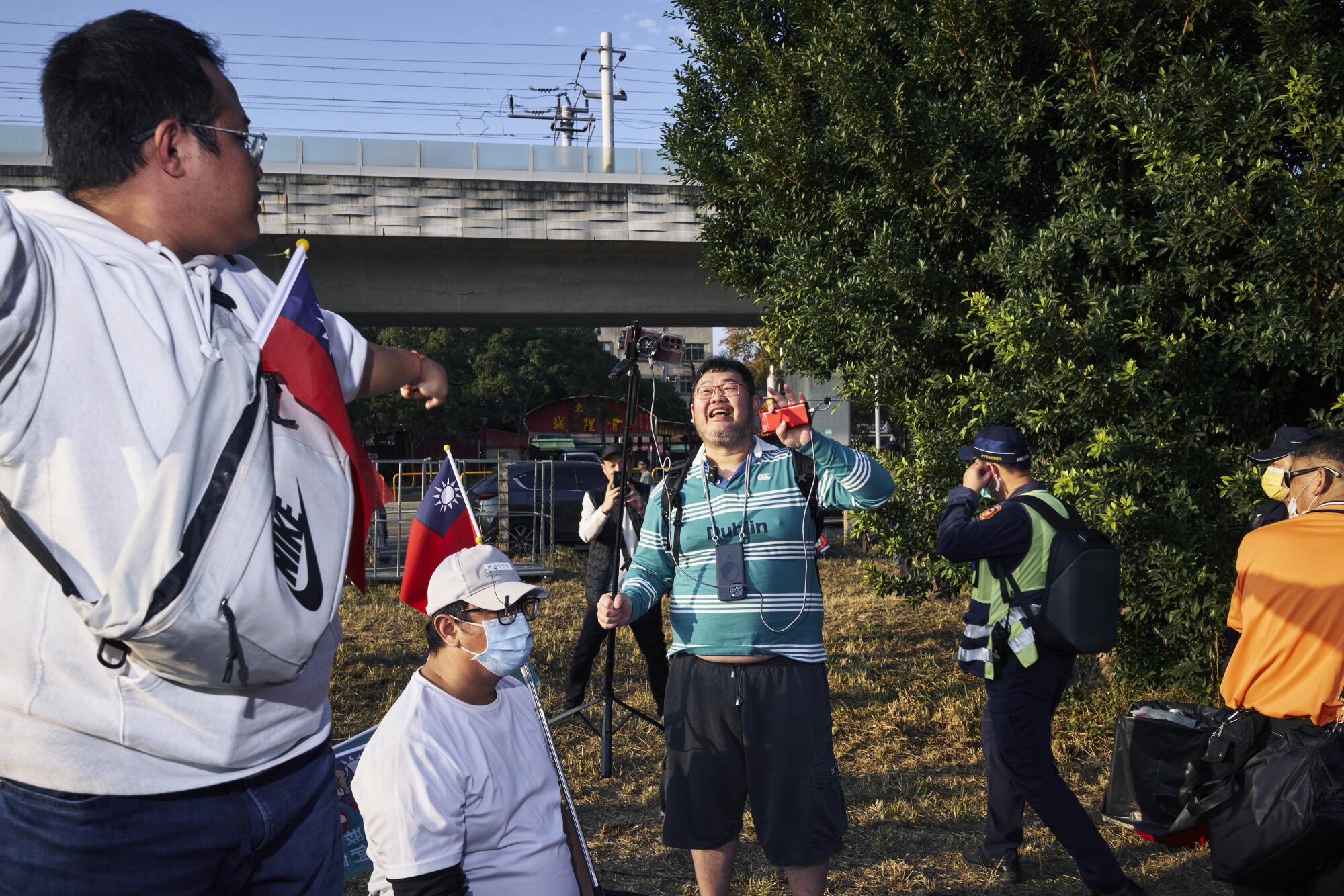
Like those of her in-laws, her fears are fanned by nebulous information she finds online — just from the other end of the political spectrum. But she’s unsure how to confirm whether what she’s reading is true.
She’s particularly concerned about how she might earn a living under Xi’s authority, since he has banned for-profit tutoring in mainland China. She’s read that dozens of journalists there have been banned from leaving, reinforcing her certainty that Beijing would chip away at Taiwan’s freedom of speech. And she’s afraid to visit herself, having heard that Chinese authorities open a security tracking file on every person who enters the country.
“People my age are probably more focused on our own world: my work, my business, my kids, my family. Whatever news is coming to me, we just take it,” she said. “I don’t know if it’s wrong or fake news. Now, we don’t know.”
Special correspondent Tzu-Wei Liu in Taipei contributed to this report.
More to Read
Sign up for Essential California
The most important California stories and recommendations in your inbox every morning.
You may occasionally receive promotional content from the Los Angeles Times.
